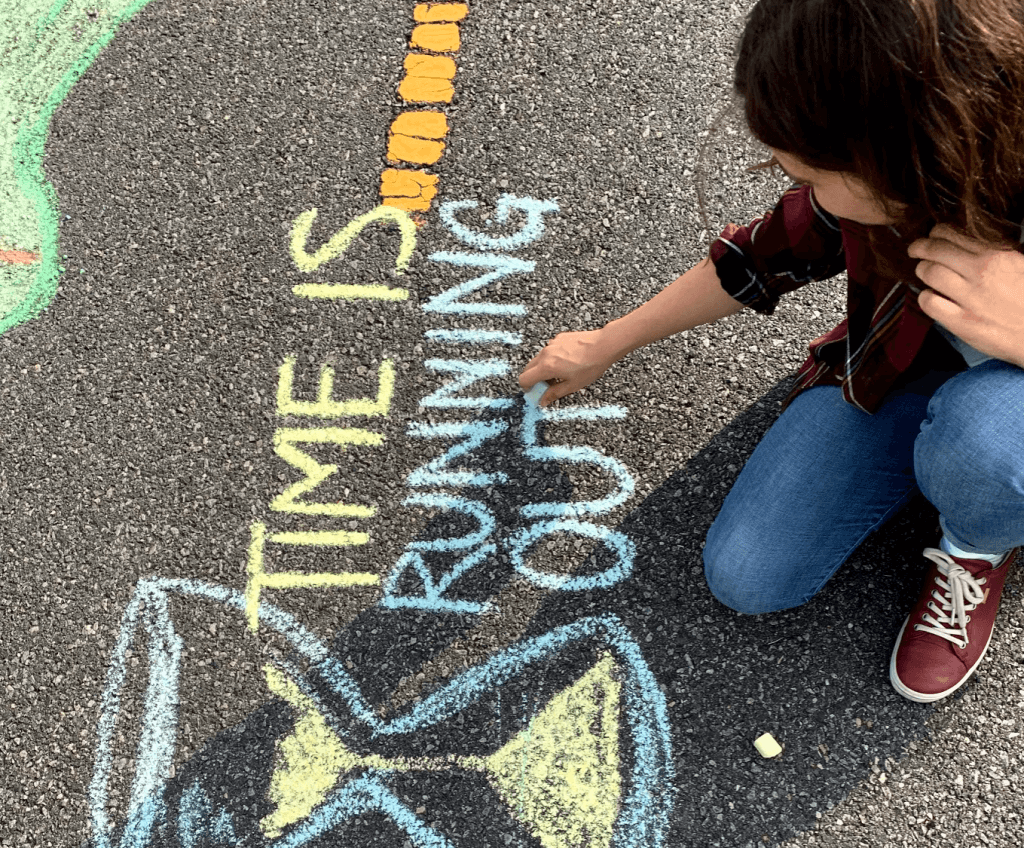Clubs and community promote sustainability and climate awareness
4 min read
Students participated in events around campus promoting environmental sustainability. / Abigail Buchholz
ABIGAIL BUCHHOLZ
News Editor
With more than 5,000 events spread out over 163 countries, the Global Climate Strike has sent a message around the world that has reached the UMW campus.
In response to the growing dangers of climate change, several campus clubs have echoed the recent wave of global activism by promoting sustainability and climate awareness.
On Sept 20, Better Energy Awareness and Mobilization (BEAM) hosted an event on the steps of the University Center where students could sign a banner with energy saving tips and write a pledge to take climate action. This event united organizations inside and outside the university.
Fossil-Free Fredericksburg, a group promoting the city’s transformation to a fossil fuel-free community, had an information table set up. The same group sponsored a Community and Kids Climate Chalk Art event on Sept 27, where the community turned out and covered the Rappahannock River Heritage Trail in color chalk promoting sustainability.
Frdericksburg’s Citizens Climate Lobby was also present, and had a table where students could write letters to their congressman explaining why climate change concerns them.
At this
event, students were encouraged to ride on a smoothie-making bike to
blend their own smoothies using just their own energy. The bike was
loaned to BEAM by Downtown Greens Inc, a group that promotes
environmental care.
On Sept 28, UMW Sustainability worked with
Into the Streets, an event sponsored by Community Outreach and
Resources, to clean up the streets of Fredericksburg.
Lis Heras, a senior biology major and co-president of BEAM, said that younger generations are so involved in climate protests and advocating for climate change awareness because it is their generation that will be the most affected if no solution is reached.
“We are going to be the ones living through the famine and all those things,” said Heras.
Some students around campus feel that the national government has failed them by ignoring the realities of climate change.
“It’s a bit frustrating to think that the physical wellbeing of future generations, the delicate balance of our ecosystem and the valuable natural resources of our Earth are critically endangered by the current trends of human activity and it’s being undermined or even ignored by our representatives,” said Rina Murasaki, a sophomore environmental science major.
Heras lamented the fact that during the United Nations conferences, President Trump failed to attend the UN Climate Summit, a choice that sparked outrage across the nation.
“The United States is a huge contributor to the enhancement of climate change, so we owe it to the rest of the world to be a huge contributor to the reversal of its enhancement,” said Lance Whitesel, a junior geography major and vice-president of the Ecology Club.
Shelby Bourquein, a junior environmental science major, expressed further concern with the political response to the climate crisis.
“It’s just difficult to hear it’s a political divide. I hope that it becomes less of a divide so we could become unified over keeping our Earth clean for the sake of cleaner water and cleaner air,” said Bourquein.
There are several student-led projects in the works to make the UMW campus a more sustainable and environmentally-friendly place.
Heras explained that the goal of BEAM is to have the campus totally reliant on renewable energy by 2050, a feat she says will be accomplished in part by using solar energy from solar panels. While several of the current buildings on campus aren’t structured for solar panels, BEAM hopes that the university contractors keep the environment in mind as they continue to renovate and expand around campus. These new roofs would need to be set at the correct angle to the sun, and have the proper electrical sources.
Another way the campus could increase its reliance on renewable energy, according to Heras, would be from buying renewable energy from organizations that produce it, such as sPower, a company that provides clean and affordable energy to customers across the United States.
Murasaki, a member of the Ecology Club, believes recycling on campus is inefficient and too much biodegradable waste is sorted into landfills. She believes that by cleaning up their act with these basic steps to sustainable living, the UMW campus could become more sustainable.
In response to the protesting efforts around the world and the work of campus sustainability groups, Murasaki feels hopeful.
“I know I sometimes get gloomy thinking about climate issues, but seeing such a large, supportive community of passionate and genuinely caring people is so empowering,” said Murasaki.
The Ecology Club has also put in the work to start a community garden in the William Street Apartment courtyard and the pollinator garden by Anderson and is trying to push for a composing site.
The environmental and sustainability clubs on campus continue to push for change and encourage student participation as their peers do so across the world.
“I think it’s really important to have more hands-on action…it’s really great to study [sustainability] in the classroom, but it’s totally different to actually go out in your life and spend your time trying to bring that change,” said Brenna Creamer, a junior geography major and president of the Ecology Club. “We encourage people to come out, especially to the Ecology Club to work with local organizations, especially on the grassroots level to make bigger change.


